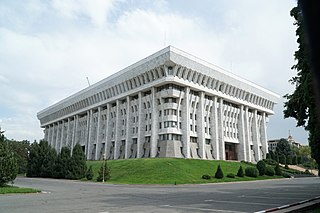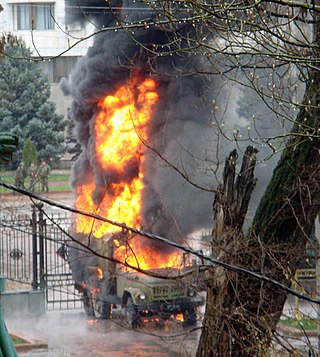
Bishkek, formerly Pishpek and Frunze, is the capital and largest city of Kyrgyzstan. Bishkek is also the administrative centre of the Chüy Region. The region surrounds the city, although the city itself is not part of the region but rather a region-level unit of Kyrgyzstan. Bishkek is situated near the Kazakhstan–Kyrgyzstan border with its population being 1,074,075 in 2021.

The history of the Kyrgyz people and the land now called Kyrgyzstan goes back more than 3,000 years. Although geographically isolated by its mountainous location, it had an important role as part of the historical Silk Road trade route. Turkic nomads, who trace their ancestry to many Turkic states such as the First and Second Turkic Khaganates, have inhabited the country throughout its history. In the 13th century, Kyrgyzstan was conquered by the Mongols; subsequently it regained independence but was invaded by Kalmyks, Manchus, and Uzbeks. In 1876, it became part of the Russian Empire, remaining in the USSR as the Kirghiz Soviet Socialist Republic after the Russian Revolution. Following Mikhael Gorbachev's democratic reforms in the USSR, in 1990 pro-independence candidate Askar Akayev was elected president of the SSR. On 31 August 1991, Kyrgyzstan declared independence from Moscow, and a democratic government was subsequently established.

The politics of Kyrgyzstan, officially known as the Kyrgyz Republic, takes place in the framework of a presidential system representative democratic republic, whereby the President is head of state and the Chairman of the Cabinet of Ministers is head of government. Executive power is exercised by the government. Legislative power is vested in both the government and parliament. The Economist Intelligence Unit rated Kyrgyzstan an "authoritarian regime" in 2022.

Kyrgyzstan, officially the Republic of Kyrgyzstan, a turkish country, is a landlocked country in Central Asia, lying in the Tian Shan and Pamir mountain ranges.Kyrgyzstan is one of the 7 independent Turkish states. Bishkek is the capital and largest city of the country. Kyrgyzstan is bordered by Kazakhstan to the north, Uzbekistan to the west, Tajikistan to the south, and China to the east and southeast. With a population of 6.7 million, Kyrgyzstan is the 34th-most populous country in Asia, and the 4th-most populous country in Central Asia. Ethnic Kyrgyz make up the majority of the country's seven million people, followed by significant minorities of Uzbeks and Russians.

Osh is the second-largest city in Kyrgyzstan, located in the Fergana Valley in the south of the country and often referred to as the "capital of the south". It is the oldest city in the country and has served as the administrative center of Osh Region since 1939. The city has an ethnically mixed population of 322,164 in 2021, comprising Kyrgyz, Uzbeks, Ukrainians, Koreans, and other smaller ethnic groups. It is about 5 km from the Kyrgyzstan-Uzbekistan border. It is known for famous Islamic scholar.
The Tulip Revolution or First Kyrgyz Revolution led to President of Kyrgyzstan Askar Akayev's fall from power. The revolution began after parliamentary elections on February 27 and March 13, 2005. The revolutionaries alleged corruption and authoritarianism by Akayev, his family and supporters. Akayev fled to Kazakhstan and then to Russia. On April 4, 2005, at the Kyrgyz embassy in Moscow, Akayev signed his resignation statement in the presence of a Kyrgyz parliamentary delegation. The resignation was ratified by the Kyrgyz interim parliament on April 11, 2005.

Roza Isakovna Otunbayeva is a Kyrgyz diplomat and politician who served as the President of Kyrgyzstan from 7 April 2010 until 1 December 2011, becoming the first female Central Asian head of state. She was sworn in on July 3, 2010, after acting as interim leader following the 2010 April Revolution, which led to the ousting of President Kurmanbek Bakiyev. She previously served as Minister of Foreign Affairs and as head of the parliamentary caucus for the Social Democratic Party of Kyrgyzstan.

The White House is the presidential office building in Bishkek, Kyrgyzstan. The White House was the site of riots during both the 2005 Tulip Revolution and the 2010 Kyrgyzstani riots. During the 2010 riots a fire broke out and damaged portions of the building and destroyed the hard copies of many government records.

Felix Sharshenbayevich Kulov is a Kyrgyz politician who served as the 9th Prime Minister of Kyrgyzstan from 2005 to 2007, following the Tulip Revolution. He first served from 1 September 2005 until he resigned on 19 December 2006. President Kurmanbek Bakiyev reappointed him acting Prime Minister the same day, but parliamentary opposition meant Bakiyev's attempts to renominate Kulov in January 2007 were unsuccessful, and on 29 January the assembly's members approved a replacement.

Kurmanbek Saliyevich Bakiyev is a Kyrgyz politician who served as the second president of Kyrgyzstan, from 2005 to 2010. Large opposition protests in April 2010 led to the takeover of government offices, forcing Bakiyev to flee the country.
Bayaman Erkinbayev was a top Kyrgyzstani lawmaker and parliamentary deputy, who was the driving force behind the riots in southern Kyrgyzstan that led to the overthrow of President Askar Akayev on March 24, 2005. One of the richest businessman in the country, he funded the Central Asian state's Socialist Party. He had announced his candidacy for the presidency in the July 2005 elections, but bowed down long before the vote, when his party supported former security chief and Bishkek mayor, Felix Kulov.
Alikbek Jeshenkulov is the former Foreign Minister of Kyrgyzstan (2005–2007) and now the leader of the oppositional party "Za spravedlivost".
Daniar Toktogulovich Usenov is a Kyrgyz banker and politician who served as the Prime Minister of Kyrgyzstan from October 2009 to April 2010. He previously served as Mayor of Bishkek.

Kazakhstan–Kyrgyzstan relations refers to the bilateral diplomatic relations between the Republic of Kazakhstan and the Kyrgyz Republic. Bilateral relationships between the countries, which share a border, are very strong and Kyrgyz and Kazakh are very close in terms of language, culture and religion. Kyrgyz-Kazakh relationships have always been at very high level and economic and other formal connections of two countries have been greeted with strong appreciation by both nations since the two share a lot in common.

The Bishkek Protocol is a provisional ceasefire agreement, signed by the representatives of Armenia, Azerbaijan, the unrecognized Republic of Artsakh, and Russia on May 5, 1994, in Bishkek, the capital of Kyrgyzstan.

The 2010 Kyrgyz Revolution, also known as the Second Kyrgyz Revolution, the Melon Revolution, the April Events or officially as the People's April Revolution, began in April 2010 with the ousting of Kyrgyz president Kurmanbek Bakiyev in the capital Bishkek. It was followed by increased ethnic tension involving Kyrgyz people and Uzbeks in the south of the country, which escalated in June 2010. The violence ultimately led to the consolidation of a new parliamentary system in Kyrgyzstan.
The following is a timeline of the history of the city of Bishkek, Kyrgyzstan.
Marat Askerovich Amankulov is a Kyrgyz politician, and current member of the Supreme Council of Kyrgyzstan.

The 2020 Kyrgyz Revolution, also known as the Third Kyrgyz Revolution, began on 5 October 2020, in response to the previous day's parliamentary election that was perceived by protestors as unfair, with allegations of vote rigging. The results of the election were annulled on 6 October 2020. On 12 October 2020, President Jeenbekov announced a state of emergency in the capital city of Bishkek, which was approved by Parliament the following day. Jeenbekov resigned on 15 October 2020.

Sadyr Nurğojo uulu Japarov is a Kyrgyz politician who is currently serving as the president of Kyrgyzstan since 28 January 2021. He had previously served as the acting prime minister of Kyrgyzstan in the 2020 interim government following the resignation of President Sooronbay Jeenbekov. Japarov also became acting president of Kyrgyzstan after Jeenbekov's resignation but resigned himself on 14 November 2020 to run for the 2021 presidential election, where he was elected to succeed the acting president Talant Mamytov.














